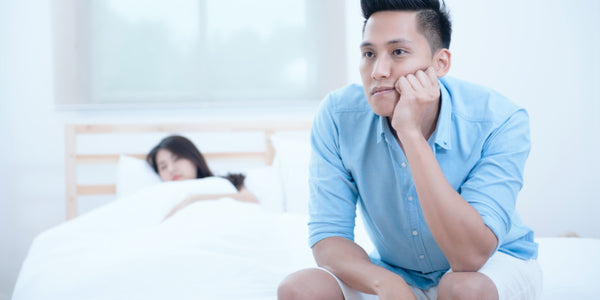
A low sex drive can be stressful and spark relationship issues. What’s more, stress and relationship issues may be the cause of a plummeting sexual interest.
But a falling sex life does not have to be long-term. It does not have to be hidden and avoided, either.
We are opening the conversation to help men, and women, better understand low libido and how to improve sexual health.
What Is Low Libido?
Low libido is a reduced desire for sex. It often is a progressive process that interferes with sexual activity.
A lower sex drive is not fixed to one gender and can occur in both men and women. It can also occur at any age, though aging is a risk factor for low libido.
Diagnosing low libido is somewhat difficult, though, as identifying what is considered not “normal” is subjective. But a loss of sexual interest and drive makes it worrisome when it starts trickling into other facets of life.
Causes of Low Libido
Men may have a reduced sexual desire or interest for a number of reasons. Some of the most common causes of loss of libido include:
• Relationship conflicts. A conflict with a partner or spouse can be at the core of low libido. This may be related to poor communication or loss of trust that disrupts closeness and intimacy.
• Certain medications. Taking certain medications can cause low libido as a side effect. Statins, antidepressants, and antipsychotics are some known medications that may lower sex drive.
• Medical conditions. Medical conditions and chronic illness may lead to low libido by compromising physical and emotional health. For instance, pain caused from arthritis may reduce interest in sex.
• Hormonal changes, specifically related to testosterone. Testosterone is a dominant male hormone that plays a key role in sexual and reproductive development. Low testosterone has been linked to erectile dysfunction, low sex drive and sperm count, and changes in body composition. Aging, obesity, and some medications are amongst many factors that can also cause testosterone to drop.
• Stress, anxiety, and depression. These negative feelings can truly tarnish sex drive. Taking medication to manage depression can exacerbate a low libido.
• Erectile dysfunction. Low libido and erectile dysfunction (ED) are not synonymous, though they often coexist. Erectile dysfunction (ED) is inability to develop and maintain an erection during sex. Men may experience reduced sexual performance and desire, too.
• Excess alcohol intake. Too much alcohol can lower inhibitions, as well as sex drive and performance.
• Smoking. Smoking can increase erectile dysfunction and reduce sex drive in men.
How to Increase Male Libido
First off, seek out the assistance of a health professional if suspicious of or struggling with low libido. They can help identify and manage the underlying cause, which may include switching medications. One may be referred to a specialist, too.
Ultimately, though, boosting your libido is on a personal basis. There are, though, many ways proven effective for increasing libido, including those detailed below.
A Nutritious Diet
Diet is important in a number of ways. First off, a balanced diet can help manage weight and lower obesity risk. Sporting a healthy weight can help boost self-confidence and, in turn, improve sex life.
Weight loss can likewise increase testosterone levels. But include more foods that increase testosterone as well, such as fatty fish, eggs, oysters, and mushrooms.
All-in-all, include more nutritious foods rich in protein, fiber, and healthy fats and practice portion control. Also limit the intake of products laden in refined flour, sugar, oil, and salt.
Regular Exercise
Exercising regularly can help people lose weight or maintain a healthy weight. Exercise also tends to help prevent or improve health conditions such as high blood pressure and diabetes.
But exercising does much more than positively affect physical health. Mental health benefits of exercise include relieving stress and boosting self-confidence, in turn augmenting sex drive.
Aim for at least 150 minutes of moderate to vigorous aerobic exercise weekly. Incorporate strength training at least two times per week as well.
Testosterone Replacement Therapy
If testosterone levels are low, a doctor may recommend testosterone replacement therapy (TRT). This often comes in the form of testosterone injections, gels, patches, and tablets.
However, this hormone therapy also comes with a set of risks. The Mayo Clinic warns the following risks of taking TRT:
• Sleep apnea, a potentially serious sleep disorder in which breathing repeatedly stops and starts
• Acne or other skin reactions
• Stimulate noncancerous growth of the prostate (benign prostatic hyperplasia) and growth of existing prostate cancer
• Enlarged breasts
• Limit sperm production
• Cause testicles to shrink
• Deep vein thrombosis, or a blood clot formed in a deep vein
Counseling
Counseling is helpful to resolve negative feelings, including depression and anxiety. This includes within oneself or with a partner.
A counselor can assist in resolving conflicts and resentments that may be impeding on the quantity and quality of sex.
Stop Smoking
There are many reasons to stop smoking, including sexual health. According to a study published in BJU International, smoking cessation significantly enhances sexual health in long‐term male smokers.
Smoke cessation can be self-regulated, though it may be challenging. Ask for support from others, including a partner or health professional.
Moderate Alcohol Intake
Just like smoking, alcohol can negatively impact health. This especially serves true if used in excess.
Men are encouraged to limit alcohol servings to two drinks per day. Standard drink sizes include 12 ounces of beer, 5 ounces of wine, and 1.5 ounces of hard liquor.
If using alcohol as a means to manage stress and other negative feelings, seek out professional help.







